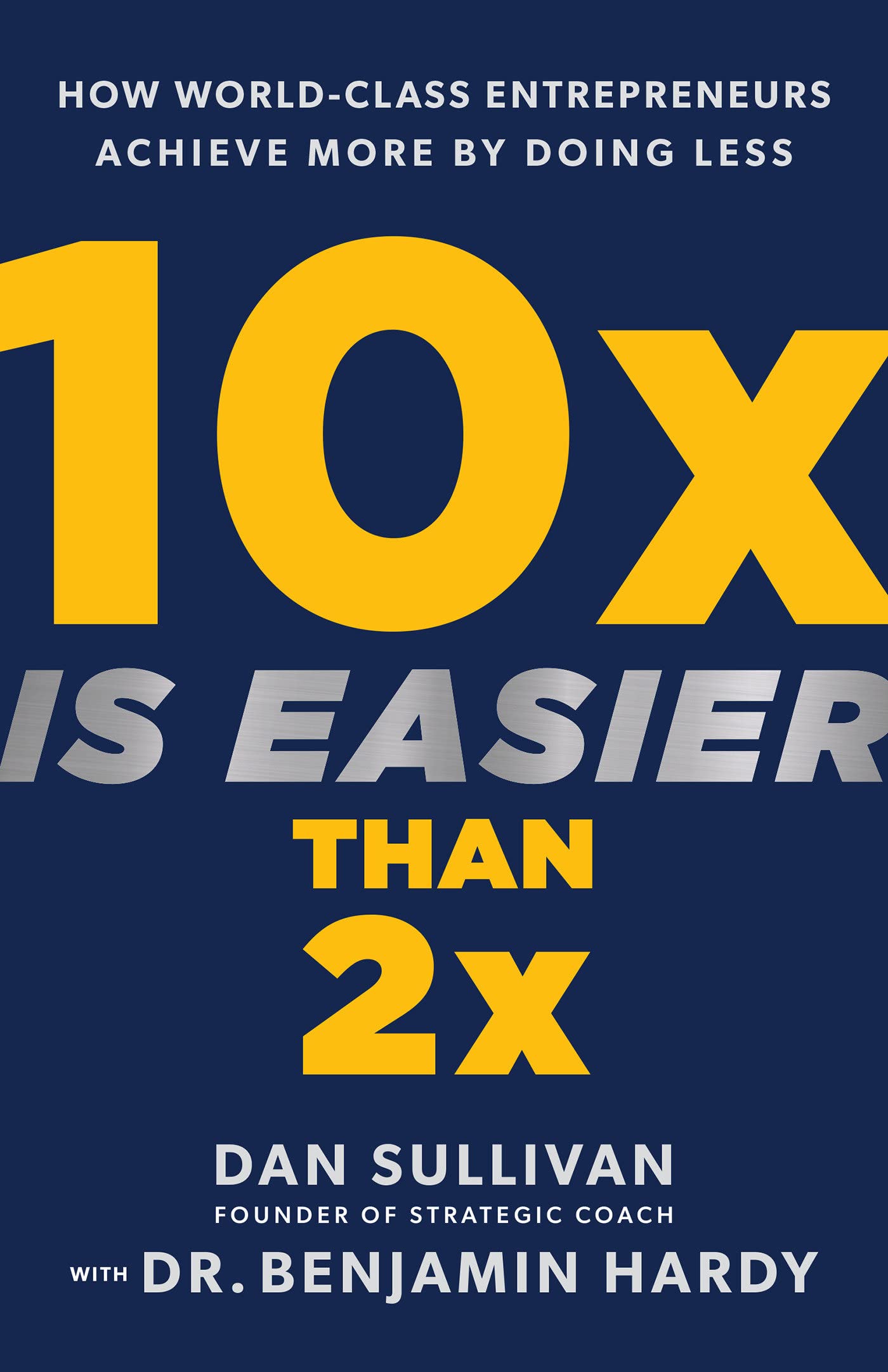
10x Is Easier Than 2x: How World-Class Entrepreneurs Achieve More by Doing Less
Dan Sullivan, Benjamin P. Hardy
About the Author

Dan Sullivan
Questions & Answers
The "10x" concept, as described in the provided text, emphasizes exponential growth and transformation in personal and professional life. It encourages individuals to aim for significant, qualitative improvements rather than incremental, linear progress. This approach differs from the traditional "2x" mindset, which focuses on doubling efforts and outputs.
The 10x concept involves:
- Transformative Goals: Setting ambitious goals that require a complete transformation of skills, mindset, and identity.
- Simplification: Focusing on core essentials, removing distractions, and eliminating non-essential activities.
- Quality Over Quantity: Prioritizing high-quality work and outcomes over quantity.
- Unique Ability: Identifying and leveraging one's unique strengths and talents.
- Continuous Improvement: Continuously evolving and refining one's approach to achieve higher levels of success.
In contrast, the 2x approach focuses on:
- Incremental Progress: Making small, gradual improvements to existing skills and processes.
- Linear Growth: Doubling efforts to achieve linear growth in outputs.
- Maintaining Status Quo: Continuing with current practices and avoiding significant changes.
The 10x concept is more challenging but offers the potential for greater, transformative results.
Psychological flexibility is crucial for achieving 10x growth as it allows individuals to adapt and respond to challenges effectively. It involves viewing oneself as a context rather than content, enabling detachment from thoughts and emotions. This detachment helps in recognizing and changing limiting beliefs and behaviors.
Strategies to enhance psychological flexibility include:
- Mindfulness: Practice mindfulness to stay present and aware of your thoughts and emotions without judgment.
- Acceptance and Commitment Therapy (ACT): Engage in ACT exercises to increase acceptance of unwanted thoughts and emotions.
- Goal Setting: Set ambitious goals that challenge you and push you out of your comfort zone.
- Continuous Learning: Be open to learning from failures and setbacks, using them as opportunities for growth.
- Seek Feedback: Regularly seek feedback from others to gain different perspectives and insights.
- Emotional Regulation: Develop skills to manage and regulate your emotions, especially during stressful situations.
Identifying and leveraging one's "Unique Ability" is crucial in 10x thinking as it represents the core of an individual's identity and value proposition. It's the unique way one approaches tasks, creating specialized value that no one else can replicate. This ability drives personal and professional growth, enabling significant transformations.
To discover and develop their Unique Ability, individuals should:
- Reflect on past experiences and achievements to identify patterns and recurring themes.
- Be honest about their passions, interests, and what energizes them.
- Seek feedback from others to understand how they perceive your strengths.
- Experiment with different activities and roles to uncover hidden talents.
- Continuously learn and develop skills that align with their Unique Ability.
- Embrace challenges and persist in the face of setbacks, as this is where mastery grows.
By focusing on their Unique Ability, individuals can make 10x transformations, leading to increased freedom, impact, and fulfillment.
To create a self-managing team and foster a culture of innovation and growth for 10x thinking, individuals should:
-
Define Vision and Standards: Establish a clear vision and set high standards that inspire and guide the team. This helps in aligning everyone towards a common goal.
-
Hire 'Whos': Recruit individuals with diverse skills and unique abilities who can handle various tasks effectively. Trust them to manage their roles autonomously.
-
Empower Team Members: Encourage team members to take ownership of their work and make decisions independently. This boosts their confidence and creativity.
-
Focus on Unique Ability: Ensure that team members work on tasks that align with their unique abilities, maximizing their potential and contribution.
-
Encourage Continuous Learning: Promote a culture of learning and innovation by encouraging team members to explore new ideas and techniques.
-
Implement Self-Management Tools: Use tools and systems that facilitate self-management, such as project management software and regular check-ins.
-
Celebrate Successes: Recognize and celebrate achievements to maintain motivation and a positive work environment.
-
Foster Open Communication: Encourage open and honest communication to address challenges and share ideas.
By following these steps, individuals can create a self-managing team that supports 10x thinking, fostering innovation and growth within their organization.
Pursuing 10x thinking presents challenges like the need for significant transformation in skills, mindset, and identity. Risks include the potential for failure, loss of existing clients and relationships, and the need for substantial commitment and courage. To navigate these challenges, individuals should:
- Embrace psychological flexibility to adapt to change and maintain focus on goals.
- Set clear, specific, and seemingly impossible goals to clarify priorities and eliminate distractions.
- Develop unique knowledge and perspectives to differentiate from competitors.
- Commit to higher standards and be willing to let go of the 80% that doesn't contribute to growth.
- Build a self-managing team to leverage unique abilities and foster innovation.
- Maintain a balance between work and recovery to sustain high performance and creativity.
- Continuously seek feedback and be open to learning and adapting strategies.